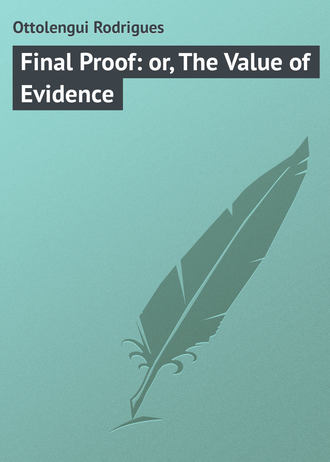 полная версия
полная версияFinal Proof: or, The Value of Evidence
"My dear Barnes: —
"I read your letter with considerable interest. As you very truly say, the case was intricate because of its simplicity. As you had followed up three theories with apparently the result that you were at least tentatively satisfied that neither held the key to the mystery, it seemed proper to take up the affair where you had left it, and to endeavor to learn whether or not Mrs. Upton had lied to you, and still had the stud in her own possession. For this and other reasons I decided to adopt your suggestion and call upon Mrs. Upton. I did so, and, as you surmised, was cordially received. She met me first in her parlor, and I at once stated to her the object of my visit.
"'Mrs. Upton,' said I, 'you are perhaps aware that I have a friendly regard for Mr. Barnes, the detective, ever since the affair of my little wager. I have received a letter from him this morning in which he states that an important criminal case compels him suddenly to leave the city; he has also given me a succinct statement of the few facts in relation to the loss of your stud, and has asked me to interest myself in the solution of this little mystery.'
"'And you mean to do it?' she exclaimed, impulsively. 'Why, how delightful! Of course you will find out all about it. To think that you, Mr. Mitchel, the man who outwitted Mr. Barnes, will take up my case! I am honored, I assure you.'
"I give you her exact words, though her flattery was somewhat embarrassing. In the course of the conversation she referred to you in terms which I repeat, though I do not at all share her poor estimate of your ability.
"'Of course,' said I, 'I am not a detective, yet I do take a trifling interest in these little problems, I find it mentally exhilarating to measure minds, as it were, with these wrong-doers. Thus far I have generally been successful, which, however, only proves my claim that those who stoop to crime are not really ever sound mentally, and consequently, either from too little or from too much care, some slight detail is overlooked, which, once comprehended by the investigator, leads unerringly to the criminal.'
"'Ah, how delightfully you talk!' said she. 'I am so glad you have taken this up, for, do you know, I rather thought Mr. Barnes a little dull, not to say stupid. Why, he actually suggested that my maid took the stud!'
"Here, I thought, was an opportune moment to follow the method which you employed with Mrs. Beaumont, and by a sudden, unexpected accusation, to endeavor to surprise the truth from her. I said:
"'Oh, Mr. Barnes has given up that idea now, and has almost adopted one even more startling. He thinks that perhaps you took the stud yourself."
"I had expected from your estimate of this woman's character, which you recall was not very flattering to her mental calibre, that if indeed it were true that she had concocted this little scheme to injure a society rival, thus taken unawares she would feign great indignation. On the contrary, she laughed so heartily, and spoke of your theory so lightly that I was practically convinced that again we were on the wrong scent. All she said by way of comment was:
"'Well, if that is the result of his investigation, he is a bigger fool than I took him to be. It is certain, therefore, that he will never discover the truth, and so I am doubly glad that he has gone out of town, and that you have consented to take his place.'
"'You must not so quickly condemn Mr. Barnes,' said I, feeling bound to defend you. 'He has really worked in this matter quite systematically, and this final theory has been reached by exclusion.'
"'I do not understand,' said she, puzzled.
"'Well, first he accepted your assurance that the maid Janet was not guilty because she had no opportunity. Then he called upon Mrs. Merivale, and from his interview with her judged that she too must be innocent, a view in which I must concur after reading his report of what passed. Then he called upon Mrs. Beaumont, and though she admitted, what you did not yourself observe, that she actually took the stud in her hand when leaving the room, yet it seems equally certain that she replaced it, as she says she did. Thus, if the stud is really not in the room, there apparently could be no other explanation than that you are misleading us.'
"'Us? Does that mean that you too held the view that I merely pretend that the stud was lost?'
"'My dear Madame,' I replied: 'such an idea, of course, seems preposterous, but a detective cannot set aside any theory without thorough investigation. In an analysis of this character the personal equation must have a secondary place. In this affair it could not help us at all. Perhaps you will not understand my meaning. But do you not see that it is just as inconceivable that either of the other ladies should have stolen this stud of yours, as it is to believe that you merely pretend that it is lost? From the view-point of the impartial investigator there can be no choice between these propositions.'
"'I must say that you are not very flattering,' said she, troubled, as she realized that social position could not protect her from suspicion any more than it would the other women. 'Why, I have my enmities, of course, and I frankly admit that I do not love either Mrs. Merivale or Mrs. Beaumont, especially not the latter. Still, to concoct such a scandalous calumny against an innocent woman would be awful. I could not be so low as that.'
"'I believe you,' said I, and I did. 'But, on the other hand, would it not be equally low for these ladies, your social equals, to stoop to petty theft?'
"'I suppose you are right,' said she reluctantly; 'but how did the stud disappear? Don't you see that I had strong evidence against one of them? It was there when they were in the room, and gone when they had left. There must be some explanation of that. What can it be?'
"'Of course,' said I, 'there must be, and there is, an explanation. The most plausible seems to be the one suggested by Mrs. Beaumont, that it rolled from the table to the floor when she put it back. It seems incredible that two searches have failed to discover it, yet it is a small object, and may be lying now in some crevice which you all have over-looked.'
"'I think not,' said she, shaking her head dubiously. 'Suppose you come up and see for yourself. You won't find any crevices. Why, we have even run wires along the line where the seat and back of the lounge are joined. No, the stud is not in that room.'
"And now, friend Barnes, we come to the finale, for I may as well tell you at once that I have found the stud, – that, indeed, as soon as I looked into the room, I suspected that it was within those four walls, in a place where no one had thought of looking, though, to mystify you a little more, I may say that it may not have been in the room when you made your search.
"I inclose with this a sciagraph, that is to say, a picture taken with the X-ray. You will observe that the skeleton of a small animal is discernible surrounded by a faint outline which suggests the form of a dog. If you understand something of anatomy, look where the stomach of the dog should be, and you will notice a dark spot. This is the shadow of the missing stud, which, as Mrs. Beaumont suggested, must have dropped to the floor. There it evidently attracted the attention of Mrs. Upton's pet dog, Fidele, who took it into his mouth, with the result shown in the sciagraph. You will ask how I guessed this at once? In the first place I had perfect confidence in the thoroughness of your search, so when I saw the dog in the room, lying on a silk pillow, two pertinent facts were prominent at once. First, the dog may not have been in the room when you examined the place, and consequently you could not have counted him in as a possible place of search. Secondly, he might easily have been present when the two ladies called, and this was probable since his mistress was lying down and the dog's sleeping-pillow was near the head of the lounge. If you noted this, you may not have comprehended its use; perhaps you took it for one which had slipped from the lounge. At all events, I do not consider that you have been at all at fault. I had better luck than you, that is all.
"Very sincerely yours,Robert Leroy Mitchel."P. S. – I do not myself believe in luck. I must also state that Mrs. Upton has sent letters of apology to the other ladies. The dog, Fidele, is to undergo an operation to-morrow. One of our most skilful surgeons has agreed to regain the stud and preserve the life of the pet. A laparotomy, I believe they, call it. – R. L. M."
THE END1
Copyright by Short Story Publishing Company. Republished from the Black Cat, by permission.



